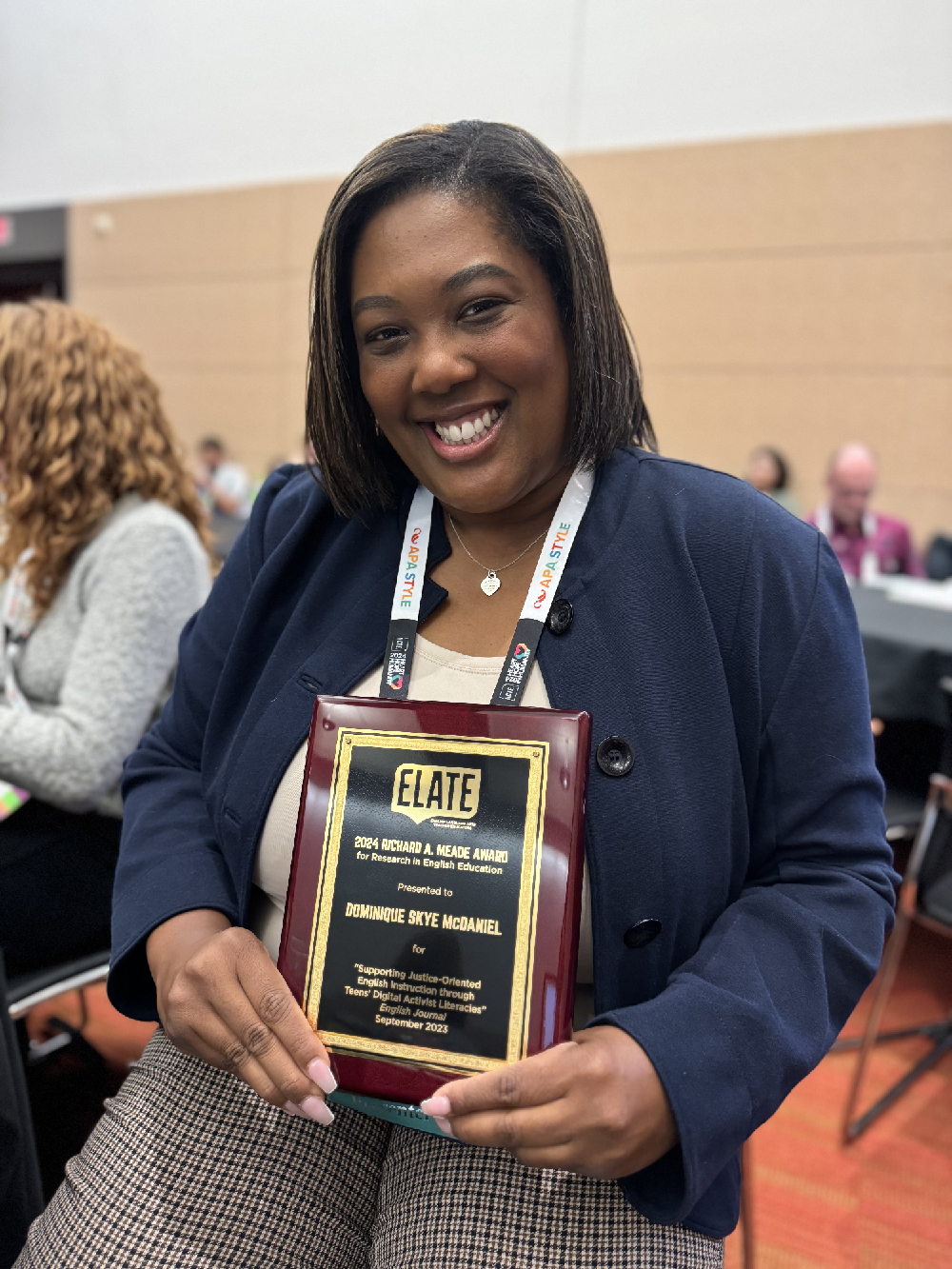National Council of Teachers of English (NTCE) Award KSU’s Dominique S. McDaniel, Ph.D., the Prestigious ELATE Richard A. Meade Award
KENNESAW, Ga. (Dec 16, 2024) — Dominique S. McDaniel, Ph. D, was celebrated as the recipient of the prestigious ELATE Richard A. Meade Award at the 2024 NTCE Annual Convention in Boston, MA on November 22nd. This national award is presented once every two years and recognizes excellence in research in English education, specifically in the “teaching of composition and in teacher preparation,” according the to the NTCE website. McDaniel’s paper, “Supporting Justice-Oriented English Instruction through Teen’s Digital Activist Literacies,” which appeared in the English Journal, explores the literacies of youth in non-traditional, non-classroom spaces such as social media platforms including Instagram, TikTok, X (formerly Twitter), and YouTube. She examines this further as it applies to activism and advocacy of youth of color around issues such as environmental concerns, racial and social justice, mental health, gun safety, and LGBTQIA+ equity issues.
 An early career scholar on the tenure track, McDaniel’s excitement about her research
and its impact on pre-service and in-service English education teachers is contagious.
She says, “What makes my research unique is that it is more public facing. I’m highlighting
the perspectives and experiences of these youth of color in social media spaces. I
am positioning youth as doing sophisticated literacies in these spaces, being changemakers
and advocates, and doing work that is more centered on how youth are driving their
communities to make change. It is a view we rarely hear in my field.”
An early career scholar on the tenure track, McDaniel’s excitement about her research
and its impact on pre-service and in-service English education teachers is contagious.
She says, “What makes my research unique is that it is more public facing. I’m highlighting
the perspectives and experiences of these youth of color in social media spaces. I
am positioning youth as doing sophisticated literacies in these spaces, being changemakers
and advocates, and doing work that is more centered on how youth are driving their
communities to make change. It is a view we rarely hear in my field.”
The award is more than a personal success for McDaniel. She hopes the national recognition for her research further advances KSU’s R2 mission, “I want to be known as a serious scholar and that’s important to me. I take pride in my work and want to be a part of Kennesaw’s mission to elevate research and productivity through transformative and timely scholarship.”
She went on to explain that understanding the digital literacy of youth, and the issues that concern them, is essential in creating welcoming spaces in a traditional classroom setting, especially for youth from marginalized communities. “I’ve had teachers talk about shifting their classroom climate to an open space for discussion where they are making themselves more welcoming to all youth, just to experience a sense of belonging, because that’s a strong thread from my research with social media. A lot of them [students] turn to social media because it is a place where they find a sense of belonging and some of them did not get that in the traditional classroom.”
When asked how this might affect veteran teachers who may not have the digital literacy that enables them to meet students where they are, she pointed to mentoring relationships between young, in-service and pre-service English educators and veteran educators, to help bridge that divide. It also helps shift the belief that the internet is only a dangerous, threatening environment, which McDaniel describes as a “deficit lens.” Taking a mentoring approach can mitigate that resistance, which is important as the digital world and social media become an integral element of youth literacy.
McDaniel says, “When they think of the assets of the spaces and take an asset-based approach it opens them up to hear the good things going on. When they operate from a deficit lens, they’re looking at what’s wrong and bad with these digital spaces. But when you look on the flip side and think about what’s good with these spaces, [it] helps teachers connect with young people around them.”
Researching what students are doing online and outside of traditional classrooms has shed new light on how youth are engaging and communicating in civic discourse around issues that are relevant to them, especially in the context of the social challenges surfaced by the pandemic and the resulting social movements. For older generations that may perceive youth are reading and writing less, McDaniel argues that, at least for the youth who are engaged in social advocacy online, they are reading, writing, and producing digital content in creative and thoughtful ways. Often, today’s youth who are active in online advocacy and activism ultimately become engaged in their communities in a face-to-face, offline environment.
McDaniel believes her research was recognized in part because of how it aligns with the intent of the award, which is to, “recognize published research-based work that promotes English language arts teacher development at any educational level and in any scope and setting.” The award was named for the late Richard Meade of the University of Virginia because of his “contributions to research in the teaching of composition and in teacher preparation.” Established in 1988, seven years before the internet was widely available commercially, Meade could not have foreseen the impact of social media and digital spaces on English education. McDaniel’s research takes a new perspective in spotlighting how English educators can access students’ digital literacy and social/civic concerns to enhance their own pedagogical practices and create more welcoming spaces for students. McDaniel says this may include incorporating culturally relevant teaching practices, adding civic and justice-themed topics, and facilitating the inclusion of multimodal/digital/social media content in classroom work.
Dominique McDaniel, Ph.D., joined Kennesaw State University in 2022 and is an Assistant Professor of English Education in the Norman J. Radow College of Humanities and Social Sciences.











